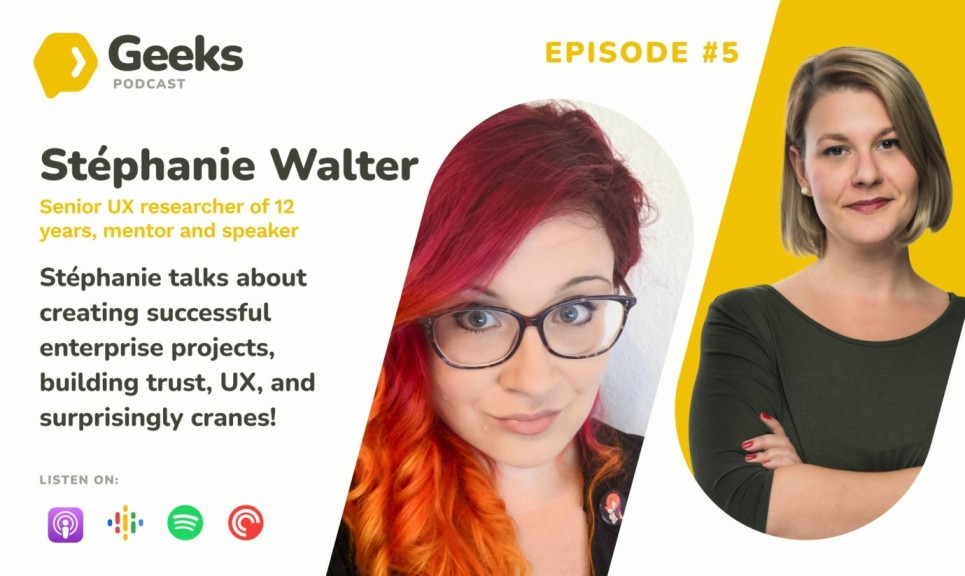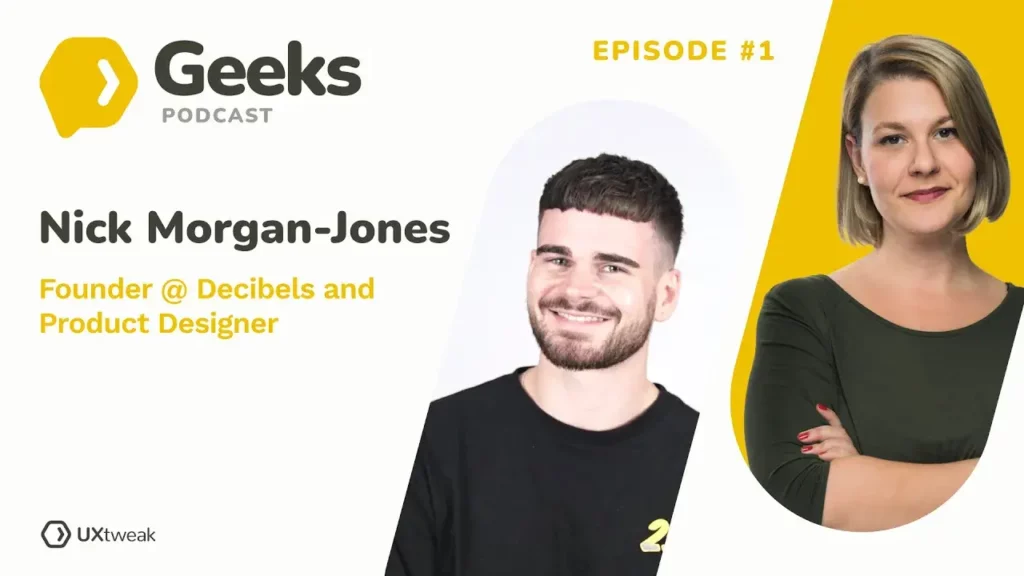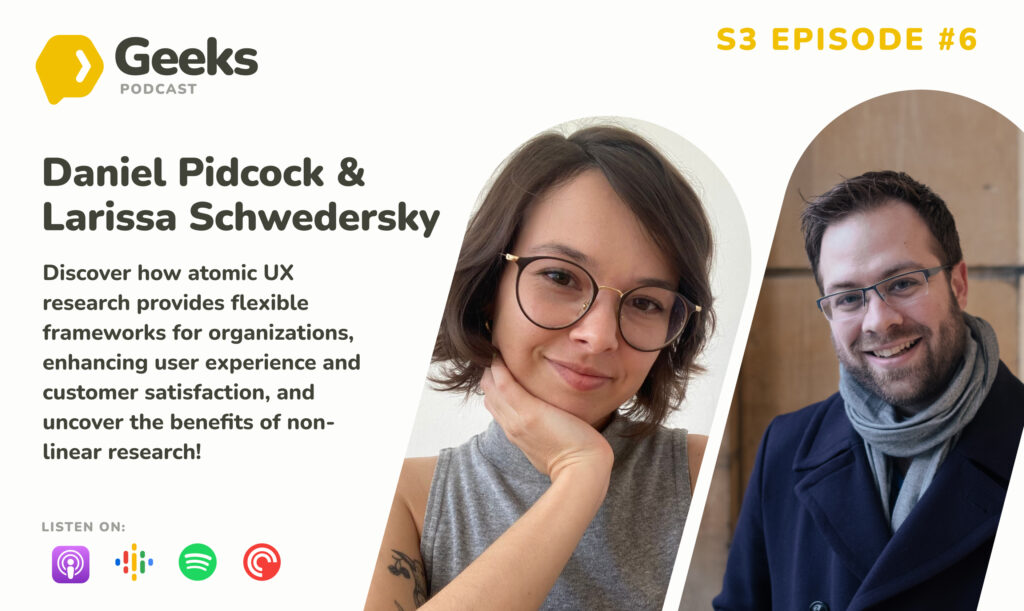If you have any tips on fantastic speakers from across the globe, feedback, or any questions, we’d love to hear from you too. Reach out to geekspodcast@uxtweak.com
Episode highlights
- 00:02:04 – Steve’s background in gaming research
- 00:05:49 – Comparing work with indie studios and larger companies
- 00:18:23 – Challenges of research in games
- 00:28:36 – Ethical considerations when conducting research with children
- 00:31:16 – Tips for starting a career in game research
About our guest Steve Bromley
Steve is an experienced user research consultant based in London, specializing in building new user research teams and conducting user research for video games. He’s the author of Building User Research Teams and How To Be A Games User Researcher.
He is also the director of gamesuserresearch.com, where he provides consultancy and runs playtests for game studios. With a passion for advancing games user research, Steve regularly speaks at global conferences and shares his expertise through writing.
Podcast transcript
[00:00:00] Tina Ličková:
Welcome to UX Research Geeks, where we geek out with researchers from all around the world on topics they are passionate about. I’m your host Tina Ličková, a researcher and a strategist, and this podcast is brought to you by UXtweak, an all-in-one UX research tool.
This is the 46th episode of UXR Geeks. Today, I’m chatting with Steve. UX researcher and an author. Steve has been in the gaming industry for over a decade and he’s helping companies to figure out why we keep playing games, why we quit them and how developers can make them better. He worked at PlayStation, consulted top studios, and he’s an author of two fantastic books, one on gaming and one of them on how to build research teams. And this recording, we got talking about how research influences game design and what is it like working behind the scenes in the gaming world? Tune in.
Hello, Steve.
[00:01:14] Steve Bromley: Hello Tina. Thank you for inviting me today. I’m really excited to be here.
[00:01:17] Tina Ličková: I am. thankful that you said yes, because you are, to me, a kind of superstar when it comes to. Research in the gaming industry. And before we start, and before I ask you who you are and what you are doing, I will just put out there so the audience understands my questions that I never played or very scarcely played PC games or any mobile games.
So some of my questions might be super basic. But it’s a great opportunity to share your knowledge, your wisdom, and people then maybe connect to you and go a little bit deeper.
[00:01:57] Steve Bromley: Of course. And I won’t hold it against you.
[00:01:59] Tina Ličková: Great. That’s a good start.
So, Steve, who are you and what are you doing?
[00:02:04] Steve Bromley: Yes. Fantastic. So my name’s Steve Bromley. I’m a games user researcher. I’ve worked in and around the games industry for a little bit over a decade now. Originally I was at PlayStation for five years based in their team in Europe. That was a really nice place to, to work because, and to learn how to be a games user researcher.
Because PlayStation is a publisher, you just get exposed to a lot of different teams, a lot of different sizes of games and genres of games and types of games, and to really see the breadth of what the games industry can be like. For the last seven years since then, I have been working as a solo consultant, so I help teams either run user research or play testing as it’s often called inside the games industry or help them build that capability in-house so that they can run user research themselves. I also write and talk about games user research a lot. I’ve written a couple of books, building user research teams and how to be a games user researcher. And I just love to advocate for this way of thinking in the games industry, user research might not come naturally to the industry. And so I, I, I like to try and solve that problem.
[00:03:15] Tina Ličková: First of all, a very big recommendation on the book Building user research teams. I enjoyed it a lot. Gave me some really Good hints on I, I am not building teams, but how to help clients build the teams for sure. And when you were mentioning PlayStation and that you had a kind of immersion possibility into different teams, I can even imagine that you have a lot of these possibilities as a solo researcher or a freelance researcher into different types of companies.
So what kind of companies are you working for right now?
[00:03:46] Steve Bromley: So yes, that has carried on into my consulting and I think one of the first things that struck me is the type of company and the type of gain they’re working on does have a huge impact on the type of studies that they want, and also their maturity with user research practice. I’ll give a small example. I dunno if you’re familiar with the idea of free to play mobile games. So they’re free to download onto your phone and you can play them for as long as you like for free, but they’ll give you opportunities to pay money to skip ahead or to avoid waiting for something. Now that. The business model is completely different to a traditional boxed game.
One that you go into a shop and you’ll, it’ll be $50 and you buy it and take it home. And that those different business models between this is something free and we want you to pay for upgrades or to save time versus you paying all your money upfront and then you’re committed for a long time, has a huge impact on what mechanics those games use, how those games apply. Design to try and encourage players to, to stick with it and retention for a long time. And it’s a consequence, it has a huge impact on the type of studies that we might end up running. So for example. For these free to play mobile games where they would like you to get hooked and play them for many months and eventually decide to pay some money. They’re very interested in retention and lifetime value, and so you might be looking at diary studies or something that helps keep people playing the game for identifying reasons people would drop out of the game over a period time, whereas for traditional boxed games that you buy from a shop. That’s less of an issue because they’ve already got your money when you’ve bought it, and so they are much more interested in traditional usability. Do players understand what they’re meant to do? Does the tutorial land those types of questions might be what you’re working on?
[00:05:38] Tina Ličková: What is the difference between working for really, or I don’t know how big they are in Europe, but bigger studios compared to some indie studios?
[00:05:49] Steve Bromley: I think that’s a great question. So I mentioned earlier that idea of play testing and to give a bit of context to that, the games industry has always done something that’s a bit like user research. They’ve had that idea of, oh, we should put plays in front of our games. We should. See what they like and what they don’t like and then make changes based on that, which you could recognize as a very clear definition of what we’re trying to do as user researchers with some nuances. Because of games, the games industry has always been doing this type of practice. I think it started when they originally in the arcades in the seventies, they would send people out to watch people play in the arcades and see, regardless of the team size they’re interested in that idea of, let’s see what players think about a games and let’s see how they’re resonating. I think the difference you see though, is with the level of rigor. So indie games often have very tight budgets, very limited ability to either dedicate a full-time role to user research, or hire someone external. It’s very often outside of their price range. And so at best, they’re just gonna be a person who does research.
They will be a game designer, be a producer and just do a little bit of play testing on the side. Now that. Because it’s not their core focus that’s gonna have a huge impact on their rigor and their methods. What I commonly see from smaller studios is not great sampling. So they’ll get users based on who’s convenient rather than actually legitimate people who reflect our real players, not ideal methods.
They might. Rely heavily on things that feel easier to administer like surveys rather than picking actually what is the right method to answer this research question. And also not a huge amount of attention paid to analysis. So taking some top line thoughts about players’ self-reported feedback, and then treating that as legitimate objective data in a way that, again, as a user researcher, you might have concerns with. So the difference I think you see is. Although indies and big publishers both do something like user research at big studios and big publishers, they have more budget to dedicate to it, and specialist roles, and also they benefit from economies of scale if you’re supporting multiple gains. It’s probably worth having a researcher because they have multiple titles to work on, and that means they can give it appropriate rigor. They’re more likely to come from a dedicated user research background. They understand things about sample bias and method selection and how best to design and run reliable studies for, for the types of objectives teams have. And so I think that’s the difference I see from working with their teams is the amount of attention they can pay it, and as a result, The methods they have available to them.
[00:08:43] Tina Ličková: for me when I’m hearing this, it’s really like the comparison in any other business. If you have the budget, you can own a researcher but I am wondering why would you then, and maybe it’s going too far, and I will go back to the original question what would be the reasons why you would recommend having a researcher in-House or very closely as an external consultant to an indie studio?
[00:09:06] Steve Bromley: I think the need is universal, right? Similar to, as you’ve seen out in other sectors, it is de-risking your production process. Games are a particularly risky area for development because they’re very hit based, where some games will take, will do fantastically well and make a huge amount of money, but the vast majority don’t.
And what I’ve, I’ve heard is. Each week, especially on online storefronts like steam, which is an online way of buying games, hundreds of games are released. There’s a huge amount of noise. Most of those games fail to sell a hundred copies, and most teams, and most studios fail and oh, at least fold after releasing one game, they have a shot, it doesn’t work out, and give up and move on. Because games is a passion industry and people do it because they love the idea of working in games. There’s always that influx of new games being made and new people are trying this. But I, I think we have to recognize that it is a risky venture. What we promise as user researchers and giving better attention to user research is ways of de-risking that game development we can help you find early on. Do people enjoy this concept when it’s a prototype? And does it feel like if you made a full game out of it, that there would be something here? Do people understand what they’re meant to do and are they gonna get through that first hour and continue playing? We can help optimize for long-term retention. So if you are spending a lot of money advertising and getting new players in that you keep them. And these are very valuable things. It’s just very hard to cut through. Yes, I, as a user researcher, I would say this is all super important and very valuable, but because especially for smaller studios, everything is important. They’re often very rushed. They often have no budget. It’s just hard to get teams to prioritize a distant risk in the future that when you release this game, no one will want it over.
Whatever’s on fire today, because there are probably a lot more short term issues hitting as well.
[00:11:15] Tina Ličková: You were mentioning the methods.
This is something I’m, although I don’t wanna stick to the methods because the methods are just a way to get somewhere to reach a goal. I am wondering how different it is in the gaming industry.
[00:11:32] Steve Bromley: I guess one of the constraints we have in user research and games is. Often it’s a very secretive industry again, because there’s a lot of very passionate players out there and people actively looking for secrets or to find out what is this team working on now? That idea of leaking the information going public before the company wanted to go public is very, it’s taken very seriously. As a consequence, some of the methods that you might want to employ as a user researcher have limitations because we want to take extra steps to prevent leaks. The reason leaks are such a bad thing is because I mentioned earlier about games being very hit driven. Often a consequence of that is game studios and publishers. Are usually spending as much on marketing. So trying to promote their game as they are in development of the game. And if you have information going early, people seeing stuff that their marketing team haven’t planned to share yet, that is throwing away a lot of that marketing budget, which again is, is as much as the development costs. So yeah, the impact of that on us as researchers means that. We have to be very careful to make sure that information from our sessions isn’t going public early. Obviously you can do the legal things that you would do in any industry of having a non-disclosure agreement. But a non-disclosure agreement is often not enough.
And because players are, they don’t see the ramifications of leaking and they get internet credibility for leaking they’re often incentivized to leak even if they have a non-disclosure agreement. And so we have to do things too, to make it even harder. For example, overin indexing on lab-based studies, places where you bring them to you compared to a lot of research in other sectors can be more remote these days, and that’s because in a lab we can take away their mobile phone, we can make sure that they’re not taking away anything from the session that shows what they saw or having any pictures of it and that’s not possible if we’re doing more remote research. One of the most impactful consequences of that, I think, and what I, I know a lot of big publishers and studios do when it comes to quantitative research. So there’s still that need to do quantitative research. You might want to do a survey and work out. I. Do players rate this level harder than the previous level, or are players taking longer on this section than we imagined they should.
And those are quantitative questions and you need to get quantitative answers to that. Now, again, if you are working in other sectors. To get a lot of people to interact with the system. You would do that over the internet and you would use some sort of analytics to capture that, and it would all be automatically done for games, especially early in development. We have to do that in a lab-based study, and so most of the big publishers have an area set up where there’s 40 or 80 gaming pods and they can bring in 80 players at the same time to play through a lot of content. Create quantitative data and we can do those kinds of larger scale surveys or quant studies in that safe lab setting.
And I think that’s quite rare. You don’t see that in other sectors.
[00:14:49] Tina Ličková: That’s very rare and that’s very interesting because it reminds me of, and I’m here, I’m going to speak as a non insider. About championships that all players have where they’re in a big room and play and it’s their full-time job. This is being a tester but there is some kind of comparison coming from this and looking at how platforms like Twitch are being stronger and stronger.
I hope I’m not saying some old news and Twitch didn’t.
[00:15:19] Steve Bromley: No.
[00:15:20] Tina Ličková: does not exist in between. And watching, for example, my ex-boyfriend, that was for whatever reason, our thing that he was playing and I was watching him and we were both relaxing doing that.
I can imagine that it’s a lot of fun to moderate.
[00:15:37] Steve Bromley: Oh, it definitely is. I’ve been lucky enough to work on party games especially for example, I dunno if you’re familiar with SingStar. It’s a karaoke game with four people, you each have a microphone. You are all singing Bohemian Rhapsody by Queen, and it’s rating everyone on their pitch and at the end you get a score saying, Hey you, you are the best at, singing Bohemian Rhapsody and everyone else was poor. That kind of thing to moderate is very fun. It’s getting groups of four friends in a room together creating a nice atmosphere because people play these types of party games. At the end of an evening, it’s a thing that you would do with friends at home. And so we’re trying to create that same setting and then moderate that group to see where are the usability issues, where are they getting stuck or not understanding what are the problems they’re encountering?
Still traditional usability and user research objectives, but with a fun, fun medium and in a fun setting. So yeah, I’m very lucky, especially on those party games and kids games as well. a much broader range of reactions and things happen in your session that again, I think you wouldn’t see if you were working on a finance website or an insurance.
[00:16:50] Tina Ličková: Yeah, that tends to be not so much fun as a party game.
[00:16:54] Steve Bromley: Yes.
[00:16:55] Tina Ličková: Here maybe a little bit stupid question, but have you ever been testing people who were served alcohol? Because if I hear these party games and we did some drunken testing as a part of a party at the office of a job that I was years ago in, is that a thing?
[00:17:16] Steve Bromley: I, I think it is a thing and I’ve, I, although I haven’t done it personally for party games, I think it, it has been done. we’ve put on. Fizzy drinks and snacks and those things make a party atmosphere. And I suspect often the groups have gone to the pub beforehand and so come back to a post pub. Think again, we’re trying to create an authentic context, so I wouldn’t be against it as an idea. I dunno whether there are any ethical concerns that I’m just not considering. But we’re trying to create a realistic environment in which these games get played. And as part of that I think that’s definitely worth thinking about.
[00:17:50] Tina Ličková: Now maybe to a less fun part, but I can imagine there’s a lot of challenges in the gaming industry. Could you maybe enlighten us on that one? Like What are the challenges? What do you struggle with? And. Maybe also not to structure them. Now I’m a little bit branching out. Sorry. But I’m interested not only in the struggles or challenges that you have as a researcher, but also to the connection of the tech and challenges that you encounter in this business.
[00:18:23] Steve Bromley: Yeah. I’ll talk a little bit about the challenges for research and then about the implications on technology. Based on what I see in other sectors and my exposure to the maturity of UX practice in some fields I would describe user research and, and UX thinking in general, in the game industry as relatively immature. I think as a. As an industry, it over indexes on evaluative studies, things like usability testing or getting some ratings on what players think and hasn’t yet seen the potential of doing generative or discovery research in this space. There’s a couple of reasons for this. I think one of the challenges we have about creating games is as well as it being a business and it’s being a commercial product, it’s also. Creativity and art, and a lot of the people who are working in that field are doing it because they like the opportunity to be creative and to make new things as opposed to it purely being a business transaction. And just like it would be very hard to go to a, I don’t know, a portrait artist and say, Hey, we should go and do some discovery research before you start doing your painting. It’s very hard to make that case for. Let’s go and understand users before you do your creativity because it gets all entwined with the idea of ego and expression and art and those concepts. And so I think, although I think there’s tremendous potential for generative and discovery research in this space, it’s still very true that players are playing games in context.
And you need to understand those contexts that make, playing those games to meet some user needs, you should understand those user needs. I think the buy-in for that thinking is lower than you can see in other industries. I think also speaking to that maturity point the production process for games is again, behind other sorts of tech. Again, a lot of the best practice that you’ll see in other fields is that idea of. Starting small experimenting, iterating from an MVP or something lean to make sure you’re going on the right path, because especially with those boxed games often they have to go for a big bang launch. They will be available on Christmas this year and we put our marketing spend on it coming out Christmas. And because as we talked about, marketing spend is such an important part of. Of the budget for games, we can’t miss that deadline. It leads them towards waterfall development practices, so putting all their effort into making a thing and then releasing it on a set day, and then it, it’s there in the world not taking advantage of that iterative development process.
And some of the potential for, for user research is enabled by iterative development to a much greater step. From a, you asked about the tech side. I don’t know if this is necessarily a complete challenge, but I think it’s an interesting opportunity for user research and games is. Often the work that we are doing is using new technology and some of the first commercial applications of new technology can be in the gained industry. Some examples being, for example I worked on the PlayStation VR headset, and when we were working on the VR headset, that was before there were any commercially available headsets available in the world. And so some of them. Some of the fundamentals of this medium and how do people use it and how do you make it clear how to move in VR, what they can interact with, how do you get ’em to put a VR headset on? Just hadn’t been established. And so you are creating a whole new language for these things, which is tremendously interesting as a researcher that’s new. But also challenging it. It’s breaking new ground and that can be very interesting. And in the past, things like augmented reality, motion controls, these new interaction methods and new technology are often first in the gained industry. And so you are often breaking new ground which is a challenge, but is also nice.
[00:22:37] Tina Ličková: What I’m also interested in are the users of, or players of games. And I’m coming from more of, from the meditation part because I read a study where they compared people doing mindfulness daily and people playing games daily.
They found out that sure, there are benefits to meditation and people, you know, to step back from the decisions and we will have a beautiful episode in mindfulness.
But what I was really surprised about was that comparing the group who was meditating and the group who was playing games, the players were much more relaxed.
[00:23:23] Steve Bromley: Oh, that’s interesting. I. I, I think what it speaks to for me is people often have perhaps an outdated or limited view on what games are like what a gamer is like. And you see this inside the games industry as well. I. Whereas if you ask people to imagine a gamer, they’re probably going to imagine a 16-year-old boy sitting on a pc, he’s got some headphones on and he has got his gaming chair and he’s ready to go. And yes, that’s true. That’s the type of gamer that exists. But one of the things I think we as user researchers need to do is encourage our teams to actually learn who really is playing our games and. What are they like and what are their goals or their objectives from it? And I think often those people go in including game developers with that stereotype in mind.
And they’re surprised by the breadth of gender, age, demographics of people coming to games. And you can also see that in genres of games. Some of the things that people play on mobile, for example, are often. A time filling, relaxing activity that they’re doing to decompress at the end of the day, rather than being that intense first person shooter type game that people first think of when they think of games. And so I think there is a huge breadth of games and gamers out there. And as such I can see how for many it could be a relaxing activity.
[00:24:46] Tina Ličková: And what is, in your opinion, the spectrum of the, I don’t wanna stereotype anybody but profile gamers because I imagine my brother, my friend, who. Again, relax. It’s fun for them. I remember my dad. 10 years ago when I came home and he refused to speak to me because he was playing a shooting game in the Second World War and he was just winning over Stalingrad and yeah, he just didn’t feel like he wants to be immersed in the real world in having a conversation with me and send me away.
And he was almost 60 at that time. what would you say, who are the people who are playing.
[00:25:27] Steve Bromley: I think as you’ve identified, there is a huge demographic difference. So I don’t have the stats to hand, but I think I vaguely remember seeing something last year saying that more ladies gained than men these days. I think a helpful way of thinking about it that I. I try and encourage teams to have is thinking about what are the needs that you’re fulfilling to help describe and aggregate those users.
So moving beyond those demographic understandings of this is a 6-year-old man or a 30-5-year-old woman moving to some people who are playing for competitive reasons. Let’s understand what are the needs of people who are playing to be the best and to beat other people and create some sort of archetype or definition of those users. Some people are doing it at the end of the day to unwind, and they might be doing word all to to relax. Or even something that like duo lingo, which applies a lot of game mechanics onto a learning setting. As a motivation. Other motivations might include opportunities to socialize with people and, for example, things that started like games such as Fortnite have become this whole. Metaverse virtual world where it’s a, a way for people to do activities with friends virtually and, socialize rather than it necessarily being a competitive game in the way it originally was. Similarly, we talked about party games again, that need is different. That I’ve got some friends together, we might play a board game, we might carry on drinking. Instead we are gonna go play a karaoke game. I think about those. Those needs that you’re filling is a great way to segment the audience. There’s some early academic work done by Dr. Bartel where he described some different motivations. I think he called them things like Killer Socializer achiever and others, and that work has been built on since, but I think that’s the way that we can make the most value of defining our audience for games.
[00:27:28] Tina Ličková: Thank you for taking the question and reframing it out of the demographics, to demographics to the needs highly.
[00:27:36] Steve Bromley: I, I’m well experienced in having that conversation because as sure it does for me all the time.
[00:27:41] Tina Ličková: Yeah, sorry. And you were also mentioning kids, and this is where, sorry for the expression, but where the shit storm is always starting when it comes to PC games, and I’m always also when I have this discussions with my friends, if not, if when to give a iPhone or a phone to a child or When to allow them to watch things on tablets or work with tablets. I am coming from the tech field, vouching for: Yeah, let’s do it as soon as possible. You are the parent. You are giving them boundaries. And I’m definitely not the type of person thinking, they’re shooting somebody in a game, when they’re at the age that they will become killers.
And as you were mentioning it, I’m wondering if there are, from your side, any learnings that influenced you or touch you when you are working with and researching with children.
[00:28:36] Steve Bromley: I hear your point about. The concerns that parents might have, and not just for the violence. There’s also a lot of these games that use mechanics to try and encourage people to pay money, pay more money, or to hook people. And we talked about retention vaguely, and some of these feel extremely unethical to, for people who are under the age of consent or not able to fully understand what, what’s being done there. From a research perspective, the implications of all of this is we have to be very careful with the ethics when we’re working with children and working on, on, on children’s games. The simplest way of handling it, at least from the studies that I’ve run and amongst this is making sure that parents are very heavily involved in research when we’re doing that. Making sure that parents come to the sessions are supervising the session as it’s happening, although we will try to explain consent and talk to children about. The data we’re capturing and what we’re doing helps ’em understand that we also need to make sure that parents are the ones who understand and are legitimately making these informed decisions on behalf of their children. Children’s games is a big market and a lot of games are made for children and sold to children. So as researchers, it is an area that we need to address again, address those basics of usability.
Do kids understand what they’re meant to do in this game? Are they able to successfully traverse through the puzzles and their levels and understand it especially for kids because their background knowledge and their context is going to be. Much more variable than it would be for an adult audience. It’s especially important to be doing this, these basics of usability and user research for these children. But we do have to keep ethics in mind. We have to make sure that both our research is ethical and also that, ultimately, the business model and the research objectives that we’re trying to answer are equally ethical, because that’s important for any researcher, right?
Ethics is part of what we do.
[00:30:38] Tina Ličková: We like to close in this podcast with some advice, and I know for sure there are a lot of folks who just made some kind of compromises in the research space of yeah, I will be researching this financial institution. I’m probably not one of many that love to research finance, but I can imagine not many people loved it and they would rather work for a gaming industry business.
What would be your advice as or recommendation, how to get and pursue a career in this field?
[00:31:16] Steve Bromley: Nice. I’m gonna give a very long answer with some context, if that’s okay. it.
Nice. working in games, as we talked about, you have unique tech challenges, unique tech. You work on it, it’s fun. And so people like the idea of working in games and that is true, but there are some compromises about working in games that I think people should be aware of before they. Seriously consider a career in it because it is a passion industry. As we talked about. You get to work with creativity and a lot of people are there because they love the idea of games. That has an implication on salaries and not often Salaries are lower in the games industry than I. In other sectors you could probably double your salary if you went from a games company to Google or Facebook. Also, we talked about the instability of games and a lot of studios folding and it’s a very hit-driven business where it’s hard to make a successful game that can lead to career instability. So people might have to, people might lose their job and especially over the last year. There’s been tremendous losses in the games industry. So it’s not the most stable industry. However, if you and your. The, your family and the people that you care for are all going in with informed decisions. It is an exciting industry to work in as I hope I’ve conveyed a bit of if you are interested in exploring it further, and especially for people from this podcast who are probably already doing user research in another field or learned a lot about user research in another field. I think hiring managers are looking for both that existing experience of user research that you’ll be taking already from that sector. So being able to come in and convey, I can run a usability study, I can design a survey, I can do interviews, I can do a diary study that is part of what you’re trying to convey. The other bit and the bit that will need perhaps more work or more reflection is showing that you understand game development and the game development process because game development is somewhat bespoke as we’ve talked about. Its maturity is different. Its production process is a bit bespoke to making games and not the same as other software. In order to have impact, you’re going to have to understand how games get made and who they are. Who are they? The stakeholders that you’re going to be working with? What does a game designer do? What does a producer do? What does an artist do? Now there’s a couple of ways to go about doing that. There’s a lot of good reading you can do.
A book I often recommend is called a playful Production Process, which talks about how to go about making games and for, from a production side, and it’s very helpful. There’s some good conferences. GDC Game Developer Conference puts a lot of videos online where experts from other disciplines are talking about what a UX designer does in games?
So what does a producer do? And again, gives you the context so that you can have that meaningful interactions with people inside the games industry. The last thing I would look at is also just doing something to show your interest in this field. And one of the activities that I often lead people through when mentoring is finding a hobbyist developer or a small, indie team, and offering them a usability review or something to, help you understand how does usability, feedback and user research fit into these kind of small development teams who wouldn’t be able to afford professional help, as a reciprocal arrangement where you are getting the experience and also getting some sort of credit for your work. And they are getting usability reviews or some sort of small user research intervention from you that can be very beneficial and help you start to see what it’s really like working with games developers in this industry.
[00:35:05] Tina Ličková: And you were giving us already some recommendation, I would like to have a recommendation on where to follow you
[00:35:12] Steve Bromley: So you wouldn’t be surprised to know I talk and write a lot about games, user research, and I want to help people either already in the industry or people interested in the industry understand how to do user research and games. My website is games user research.com, and there, if you sign up, you can get a couple of free mini books about:
What does a career in games look like? What type of studies you’ll be running, how to, and also regular articles about some of the nuances of running research inside the games industry that if you are interested in doing this as a job or just interested in applying some of the best practice from games into your own work and exploring, what’s the ramifications on gamification, for example, you might find very relevant and interesting.
So yes, games user research.com is probably my best place to recommend.
[00:35:58] Tina Ličková: Thank you. Thank you for sharing your journey and the specific aspects of the industry with us.
[00:36:05] Steve Bromley: That’s all right. Thank you for the invite, and it’s lovely to talk today.
[00:36:08] Tina Ličková:
Thank you for listening to UXR Geeks. If you enjoyed this episode, please follow our podcast and share it with your friends or colleagues. Your support is really what keeps us going.
If you have any tips on fantastic speakers from across the globe, feedback, or any questions, we’d love to hear from you too. Reach out to geekspodcast@uxtweak.com
Special thanks goes to our podcast producer, Jana Filušová, our social media specialist Daria Krasovskaya and our audio specialist Melisa Danišová. And to all of you. Thank you for tuning in.
💡 This podcast was brought to you by UXtweak, an all-in-one UX research tool.
















